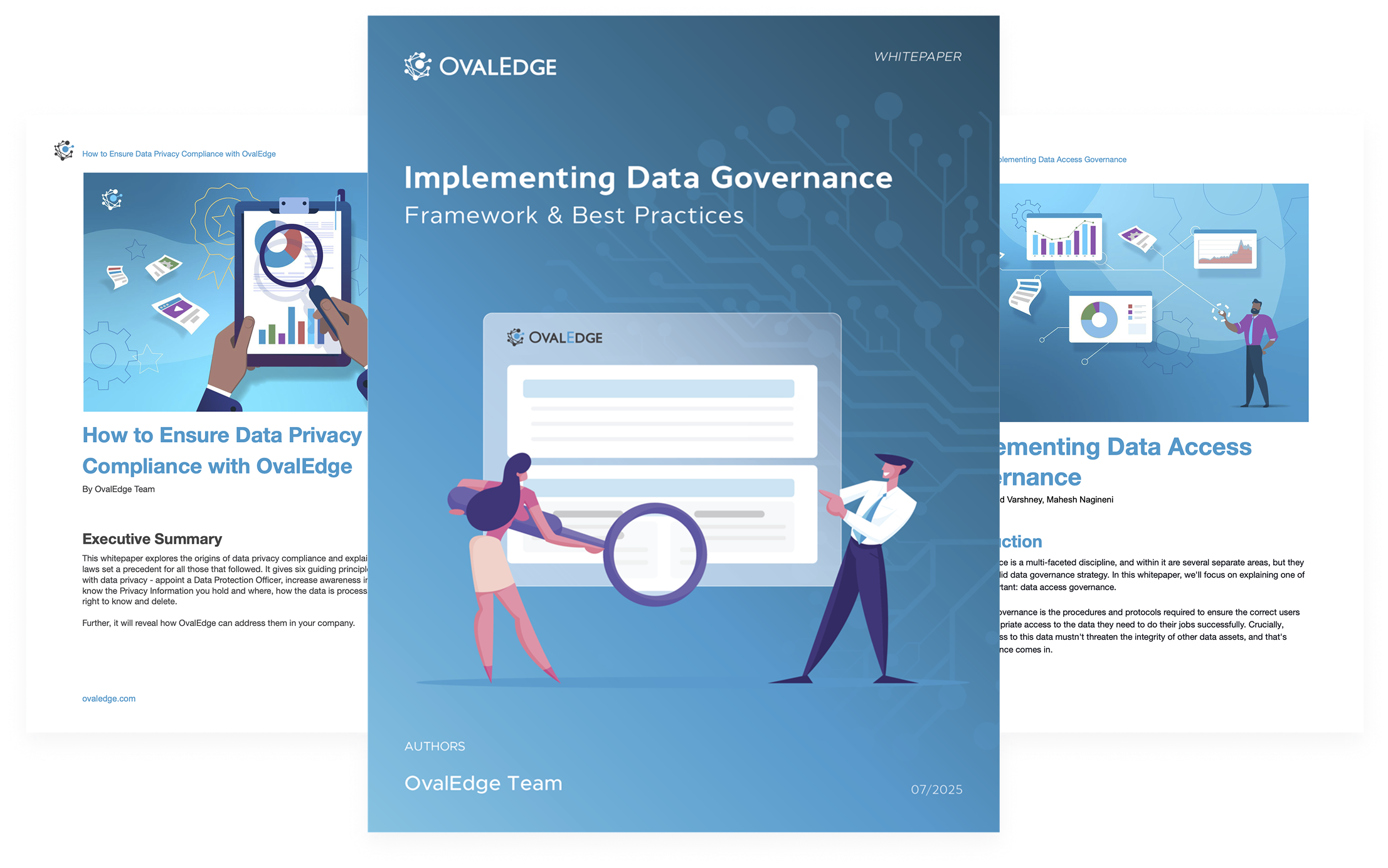Table of Contents
Fast-Tracking Data Governance with Agentic Metadata Analytics
Data governance doesn’t have to be slow or complex. askEdgi uses agentic AI to perform metadata search and analytics, turning weeks of manual governance into minutes. From identifying PII and aligning glossary terms to generating governance success metrics without costly dashboards, askEdgi makes governance fast, measurable, and business-ready.
Data governance is essential — but let’s be honest, it’s also slow, manual, and expensive. Teams spend weeks combing through reports, building spreadsheets, and holding workshops just to standardize a single KPI or locate sensitive data. By the time the work is done, business priorities have often shifted.
askEdgi changes that equation.
Powered by agentic AI that performs metadata search and analytics, it makes governance both fast to execute and easy to measure.
Here’s how askEdgi accelerates governance in two powerful stages: Fast-Tracking Governance and Measuring Governance Success.
Stage 1: Fast-tracking governance
Governance tasks that once took weeks of manual effort can now be completed in minutes.
askEdgi automates metadata analysis through recipes. Recipes are prebuilt analytics combining LLM-powered text analysis with statistical techniques to solve common governance challenges. They’re available directly in the askEdgi Marketplace.
askEdgi marketplace
Related post: How an AI-powered data catalog transforms discovery and governance
Example: Unreadable tables curation
Every data team has faced this problem: cryptic, non-human-readable table names like tb_12984x that make no sense to business users. AskEdgi automatically identifies these tables so data stewards can prioritize which ones need descriptions or glossary mapping, improving usability across the catalog.
Example: Glossary alignment
Agreeing on what a KPI actually means should not take weeks — but in most organizations, it does. In healthcare, the definition of Length of Stay often varies: some departments calculate it in days, others in weeks, and others in hours. Resolving these differences traditionally required workshops, manual report reviews, and costly analyst time.
“In banking, a similar challenge arises with terms like Non-Performing Loan (NPL), where different teams may use 60, 90, or 120 days as the cutoff. askEdgi surfaces these inconsistencies instantly, ensuring a single, regulator-approved definition.”
askEdgi’s Glossary Alignment Recipe changes this. It scans across metadata, reports, and queries to surface every variation of a definition automatically. Governance teams can then align on a single, standard meaning, in hours instead of weeks.
Stage 2: Measuring governance success
Doing governance is only half the battle. The bigger challenge is showing it’s working.
Traditionally, organizations built expensive BI dashboards just to track governance KPIs like glossary adoption, lineage completeness, or PII coverage. These dashboards were slow to build, costly to maintain, and often underused.
askEdgi flips this model.
Using the same metadata recipes that power fast governance, it automatically generates spreadsheets with governance performance metrics — no dashboards required.
Teams can now monitor governance performance continuously on:
-
Glossary Adoption – How consistently are business terms being used across systems?
-
PII Coverage – What percentage of sensitive fields are identified and protected?
-
Lineage Completeness – How much of the data landscape is mapped and trusted?
These metrics make governance visible, measurable, and ROI-driven. Instead of being seen as a cost center, governance becomes a proven enabler of compliance, trust, and adoption.
Conclusion
askEdgi unites fast execution with measurable success into a new model of governance. By harnessing agentic AI and metadata analytics, it transforms governance from a costly burden into a business accelerator.
With askEdgi, governance is not only faster — it’s smarter, scalable, and built to prove its value.
Deep-dive whitepapers on modern data governance and agentic analytics

OvalEdge recognized as a leader in data governance solutions
.png?width=1081&height=173&name=Forrester%201%20(1).png)
“Reference customers have repeatedly mentioned the great customer service they receive along with the support for their custom requirements, facilitating time to value. OvalEdge fits well with organizations prioritizing business user empowerment within their data governance strategy.”
.png?width=1081&height=241&name=KC%20-%20Logo%201%20(1).png)
“Reference customers have repeatedly mentioned the great customer service they receive along with the support for their custom requirements, facilitating time to value. OvalEdge fits well with organizations prioritizing business user empowerment within their data governance strategy.”
Gartner, Magic Quadrant for Data and Analytics Governance Platforms, January 2025
Gartner does not endorse any vendor, product or service depicted in its research publications, and does not advise technology users to select only those vendors with the highest ratings or other designation. Gartner research publications consist of the opinions of Gartner’s research organization and should not be construed as statements of fact. Gartner disclaims all warranties, expressed or implied, with respect to this research, including any warranties of merchantability or fitness for a particular purpose.
GARTNER and MAGIC QUADRANT are registered trademarks of Gartner, Inc. and/or its affiliates in the U.S. and internationally and are used herein with permission. All rights reserved.



